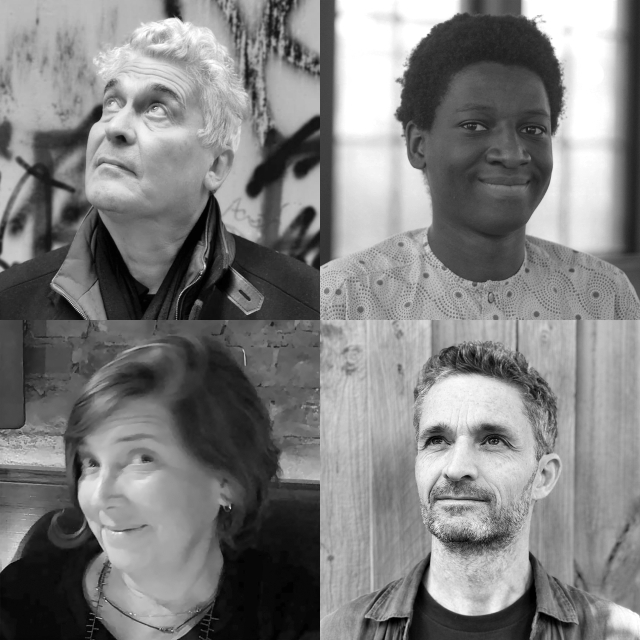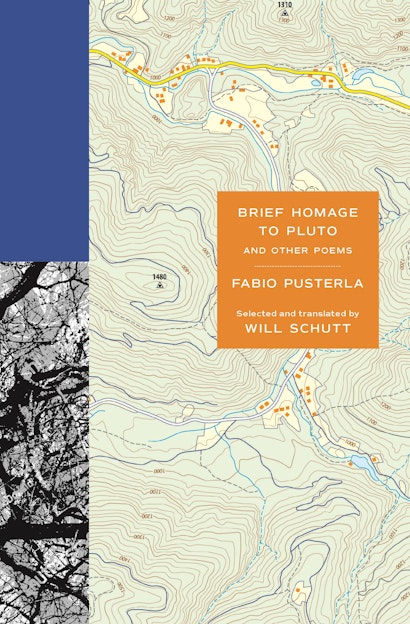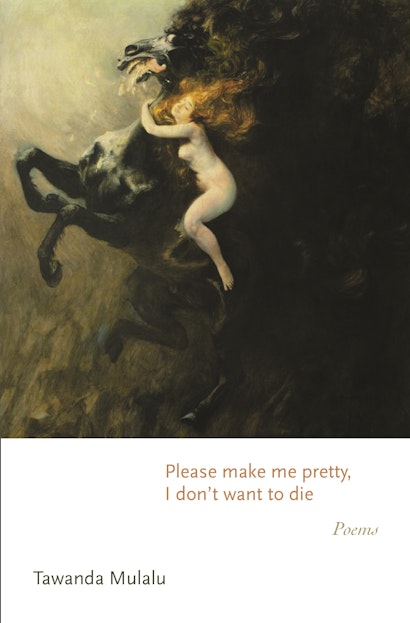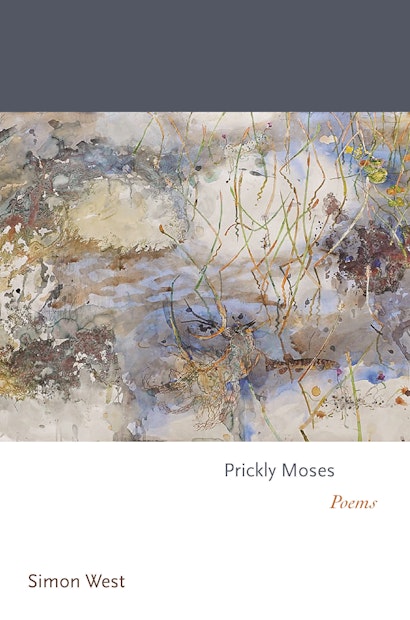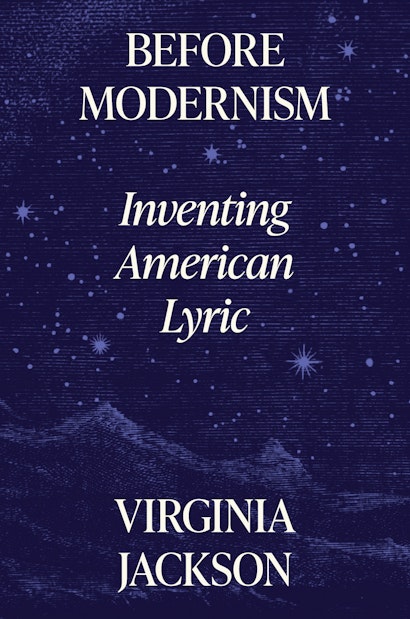Across the world, poems have existed for millennia, asking questions and telling stories that affirm, interrogate, celebrate, or simply sit with the mysteries of human life. As more and more of our lives become carved away by forces of consumerism, these mysteries—and the desire to unearth them—may become buried deeper still, perhaps prompting us to wonder, how does poetry help? This is the question we asked a group of our writers to reflect upon in honor of National Poetry Month. Spanning generations, disciplines, and languages, these dazzling perspectives invite us to cherish, study, and participate in the time-honored, innately human practice of poetry.
Fabio Pusterla (Translated by Will Schutt) | Brief Homage to Pluto and Other Poems
The most important Italian poet of the twentieth century, Eugenio Montale, said in his speech at the Swedish Academy that awarded him the Nobel Prize, “At any rate I am here because I have written poems, a completely useless but hardly ever harmful product, and that is one of its claims to nobility.” How should we take his words? Maybe, behind their veil of irony, they mean that in a world that privileges utility (the kind that can be quickly monetized, based on market values, not the far more complex kind dreamed of by Enlightenment thinkers: social utility), writing poems, producing an utterly useless product, is one of the least ignoble things that we can do.
The useless poem-product unmasks our dependency on commodity goods, on the commodification of our lives and ourselves, and momentarily blunts its power. Faced with a poem, when we actually encounter one, we are returned to the depths of our being, to those regions of the mind and consciousness that commodification tends to deny or forget. We live on the go, always at the mercy of forces that we can’t perceive. We work, we love, we hate, we eat, we sleep, we survive, we fall ill, and finally we die, always or almost always swayed by the needs of the moment, always restlessly wandering the aisles of the Giant Supermarket. Even our attendance to artistic languages doesn’t completely elude this model: a film, a painting, or a piece of music also has an economic value and therefore market utility. But here comes something really useless, a handful of rhyming words, a poem. And it tells us to stop, to breathe, to listen. Listen to these words, to their sound. Listen to what’s welling up inside of you, as if from a part of your being that, though you’d forgotten it, is where you feel at home. You feel naked, defenseless, yet free, free in your breath and in your body, in which courses what Dylan Thomas called “the force that through the green fuse drives the flower,” and for a minute Wallace Stevens’s necessary angel appears, capable of countering the pressure of reality with something gentle and vast.
Are those words over the top, a bit grand? Maybe. But I can find no others to explain an apparent paradox: anyone judging the existence of poetry today based on the mainstream media would gladly conclude that poetry doesn’t exist. It’s rarely talked about, and the few copies that get printed are often hard to find even at bookstores. Yet not only does poetry exist, but so do readers of poetry—more than you might think. For better and worse, there exists a widespread need of poetry. Many people try to write it, and with what results doesn’t matter now. What drives a human being to spend days and months sitting at a desk chasing a poetic dream? There are thousands of more fun—and more useful—things they could be doing. But there they are, trying to write. Why, if the stakes are so low? And why, sooner or later, will someone in a similar and no less excruciating solitude come along and read what they’ve written?
It’s hard for me to explain this almost subterranean phenomenon in purely sociological terms. There’s more to it. In an age as psychically stifled as ours, poetry, expunged from the official records of reality, proliferates, almost invisible. Maybe, in its very useful uselessness, it helps us to recover something that we’ve lost, to imagine something that isn’t there. To walk.
Tawanda Mulalu | Please make me pretty, I don’t want to die: Poems
How does poetry help? I don’t know. At one point, how poetry helped me felt super self-evident. I was a very bummed-out freshman in college struggling to get any academic work done. I spent most of my nights slumping about on our dorm room’s decaying, squishy, maroon futon. Reading poems was really the only thing that I had going on back then that felt real (and even then: it barely felt real, I barely felt real). I felt similarly during the early months of the pandemic, while I was floating on Zoom school in a college roommate’s basement with my camera turned off, with Google Chrome tabs opened elsewhere and scrolling through anxious tweets by poets I deeply admired, wondering if my life could be something else, somewhere else.
I’m feeling kind of better nowadays, so my desperation towards poems isn’t as excessive. Which makes me wonder often why I bothered with the whole thing in the first place. Had I been writing fiction this whole time, then I might have been in danger of actually being able to make a living off my writing—or something like that! The usual thing I say in response to questions like this is that poetry is particularly interesting to me because, of all art forms I know, it feels like it’s best able to represent the energy of human consciousness. I’m not sure how intellectually coherent that argument feels to me anymore given that, having recently written a first book of poems, I now directly know exactly how constructed rather than merely thought a lyric poem is. I’m also beginning to understand that my literary tastes are pretty Modernist (or at least I’m told this) so of course I’m the type of writer/reader who might think that poems are special because they seem well-positioned to replicate/represent human consciousness. But there’s an obvious missing linkage here with regards to the original question: why would being able to create art that feels like being conscious “help” anyone?
I don’t know! That was just a really strong intuition I held for a while, that the best art should be able to not only show how a person feels but make the consumer of the art feel something really close to what the artist felt while making it. I also thought that this particular intuition had some kind of moral bent to it, too: if poems could sensibly make us feel close to one another, then we’d understand each other more, and so we’d all be less mean to each other. Kumbaya, my Lord, kumbaya. But I’m beginning to feel that this might be just bad ethical reasoning. And much worse aesthetic reasoning (well, worse for me really, insofar as I want to write better poetry tomorrow than what I’m writing today). Why worse? I think focusing too much on the potential moral and therapeutic aspects of poetry potentially constrains our imagination(s) of what we can do with it. But I haven’t developed strong enough reasons yet to be able to support this claim. It’s just something I worry about a lot. Because I want poetry to be able to think of everything and anything it wants to, no matter what. This might also be a bad intuition. I’ll have to see it play out. Hopefully it helps me in the long run. Here’s hoping, I guess.
Simon West | Prickly Moses: Poems
The purpose of poetry is to remind us
how difficult it is to remain just one person,
for our house is open, there are no keys in the doors,
and invisible guests come in and out at will.
(from ‘Ars poetica?’ Czesław Miłosz, trans. by the author and Lillian Vallee)
Imagine a house. Not your own house, but a dwelling you visit as a guest or stranger for the first time. Think about that moment of entering with all your senses on high alert. You take note of the furnishings approvingly or disapprovingly, and you find yourself tempted to interpret the character of the occupants from the objects collected. There is something about being in an unfamiliar room that makes you feel slightly different yourself. You move around to get an idea of the place; you observe the way the windows frame the world outside; you start to feel at home or out of place, excited or dull; and all the time you’re taking your bearings anew.
In Italy, on entering a house as a guest it is customary to say, Permesso? This expression might be translated as “May I come in?,” but it has become so habitual that it is often stated rather than inflected as a question. The word has become part of a ritual for acknowledging the moment of crossing a threshold.
I evoke such moments because I see similarities with the way we encounter poems. The word stanza, which we use to denote the paragraphs into which poems are divided, comes from the Italian word for room. John Donne was aware of this when he wrote in “The Canonization”:
Wee can dye by it, if not live by love, And if unfit for tombes or hearse
Our legend bee, it will be fit for verse; And if no peece of Chronicle wee prove, We’ll build in sonnets pretty roomes;
“We’ll build in sonnets pretty roomes” is characteristic of Donne’s wit and playfulness. But I like to imagine that there is something about Donne’s pun across languages that resonates with deeper truths. For a poem is a room, one that we as readers enter to take our bearings afresh. It can be as eerie and intimate as a stranger’s bedroom, or as collective as a cathedral. It can be as frantic as the lobby of a train station, or as calm as a hermit’s cell. Whatever the room, when we enter that space, we become more aware of others and the world around us. We also experience ourselves slightly differently.
In evoking these architectural images, I do not want to suggest that words in a poem are riveted like crossbeams into a wall, nor that poetry is a kind of refuge from the world. Think rather of Robert Frost’s “Silken Tent.” The rooms of poetry are fluid spaces, alive with what Coleridge calls the “interinanimation of words.” And because poetry is made from the stuff of language and words are products of human society, the poem embodies the spirit not only of communication, but of community. So, think of the open house, the house as conviviality, the moment of voicing “permesso!” As Donne says in “The Good Morrow,” this coming together of two individuals can make “one little room an everywhere.”
Another image in Donne, this time from “The Flea,” describes how that most intimate of insects embodies the communion of two lovers when it mingles with their blood:
This flea is you and I, and this
Our marriage bed, and marriage temple is; Though parents grudge, and you, w’are met, And cloistered in these living walls of Jet.
The flea is you and I. Donne suggests we must seek to draw connections between ourselves and others, and between ourselves and the world at large, and thereby hope to understand a little more clearly the state of reality in which we exist. It is in poetry’s living walls of jet that we can begin to do this.
Virginia Jackson | Before Modernism: Inventing American Lyric
First, what is poetry? How do we know a poem when we see one? Supreme Court Justice Potter Stewart infamously said of obscenity, “I know it when I see it,” but I’m not sure I can say the same thing about poetry. Stewart’s definition depended on everything he thought he knew about sexuality, sociality, self-expression, and a lot of other things we would now say he was wrong about, and the truth is that a poem is something you know how to recognize only if you have already decided what you think poetry is. Yet everyone seems to know that it would be wrong to make that decision once and for all. How can we know if poetry can help when we don’t seem to want to know what it is?
When John Stuart Mill wrote an essay entitled “What is Poetry?” he began by insisting that “the vulgarest of all” of the possible answers to this recurrent question is “that which confounds poetry with metrical composition.” But many readers of poems have enjoyed just such confusion—in fact, what makes thinking that a poem is an exercise in format seem vulgar to Mill is precisely that this way of recognizing poems is so very common. When the enslaved American Romantic poet George Moses Horton was asked to describe how he became “the Colored Bard of North Carolina” even before he learned to write, he explained that when he was learning to read, he would pick up whatever piece of paper was “lying about…in order to examine it whether it was written in that curious style or not. If it was not, unless some remarkable prose, I threw it aside; and if it was, I as carefully preserved it as I would a piece of money.” While Mill insisted that “the word ‘poetry’ imports something quite peculiar in its nature, something which may exist in what is called prose as well as in verse,” Horton clearly understood that poems are characterized by a style that is medium-specific and immediately recognizable. It is that structure that gives them not only surplus value, but use-value, “like a piece of money.”
For the last two hundred years, something like Mill’s assertion has informed most Anglo-American thinking about poetry. Meanwhile, Horton’s deceptively metapragmatic approach to the exchange value of things that look like poems—his distinction between poetry and prose on the basis of surface recognition, of conspicuous or graphic “style”—goes virtually unmentioned. As often as not, actual poems let readers like Mill—and Emerson and Hegel and Shelley and Arnold and Eliot and Frost and Stevens—down. Ben Lerner has gone so far as to say that “the problem with poetry is poems.”
Lerner is doubling down on a persistent way of thinking about poetry as an indefinite, transcendent feeling or space or mode that the poet enters in order to convey that transcendence to a reader. That equation of poetry and ineffability has become part and parcel of the modern concept of poetry itself. But what if, like Stewart’s definition of obscenity, that idealist definition of poetry is also part and parcel of the legacy of an ineffable and transcendent whiteness, of ideas we should be embarrassed to keep repeating?
When Horton wrote in 1828,
O! Liberty, thou dove of peace,
We must aspire to thee,
Whose wings thy pinions must release,
And fan Columbia free,
he was writing what may still look like a poem but what also may not quite seem like poetry to Mill’s descendants: the common meter abab quatrain, the common apostrophe to common figures, and the common sentimental turn are all symptoms of an emergent Black poetics that wanted to convey something other than transcendence or ineffability. In 1865, as Horton was being led out of North Carolina by Union troops, those common poetic figures of lyrical flight could not set him free. Instead, the pinioned winged figure for poetic liberation both flies and binds, and for Horton, neither he nor the country in which he lived was yet unbound. It still isn’t.
What if rather than thinking that poetry is what poems can never achieve, we began to think about poems as what ideas of poetry can never define? Poems depend on the people who read and write them, and it is people, not poems, that set one another free. So, what is poetry? Who knows, but we have been wrong to think that poems are the problem with poetry. Instead, poetry may be the problem with poems, since Horton was surely right that of poetry, poems are all we have.
Fabio Pusterla is a prolific poet, essayist, and translator, most notably of the work of Philippe Jaccottet. His honors include the Swiss Schiller Prize, the Gottfried Keller-Preis, and the Premio Napoli for lifetime achievement.
Will Schutt is the author of Westerly, winner of the Yale Series of Younger Poets Prize, and translator of My Life, I Lapped It Up: Selected Poems of Edoardo Sanguineti, among other works from Italian. For his translations of Fabio Pusterla’s poetry he received the Raiziss/de Palchi Award from the Academy of American Poets.
Tawanda Mulalu was born in Gaborone, Botswana, in 1997. He is the author of the chapbook Nearness, and his poems have appeared in many publications, including the Paris Review, Brittle Paper, and Lolwe. He lives in New York City.
Simon West is the author of four previous collections of poetry, including Carol and Ahoy and The Ladder, which was shortlisted for the Australian Prime Minister’s Literary Awards. He is also the author of Dear Muses? Essays in Poetry and the editor and translator of The Selected Poetry of Guido Cavalcanti. He lives in Melbourne, Australia.
Virginia Jackson is UCI Endowed Chair in Rhetoric at the University of California, Irvine. She is the author of Dickinson’s Misery: A Theory of Lyric Reading (Princeton) and the editor (with Yopie Prins) of The Lyric Theory Reader: A Critical Anthology.
